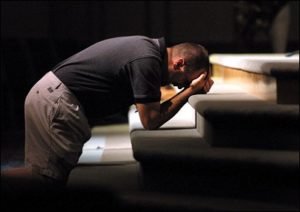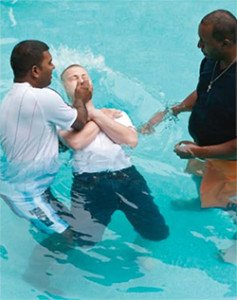
Basilica of St. John Lateran, Rome, interior. (Wikimedia).
So as I journeyed to the Catholic Church, sola scriptura didn’t put up much of a fight. I don’t remember ever even considering, at the earliest stages, whether a particular doctrine could be found in Scripture: if it could be found among the teachings of the early Church Fathers, that was good enough for me. I felt that I was rediscovering the lost treasures of the faith, those that my Protestant brethren had cast away.
I had begun reading books and reading the Catechism of the Catholic Church. For some six months, I attended weekly and daily Mass at St. John’s, falling in love more and more deeply with the Mass and longing to receive my Lord in the Eucharist. I went up every time for the pastor’s blessing. He praised my diligence and dedication in attending, even though I couldn’t receive. Catholic friends elsewhere asked why I put up with it for so long, why I attended like that for over a year, some fifteen months, when I probably could have asked to enter the Church some other time. For me, it felt like an important part of the journey: traveling with the Lord and learning more of His Church’s ways, as I longed to be with Him in more and deeper ways.
It is probably a good thing that I took the long road. Though the going seemed to go easily at first, I did come to rough terrain — Catholic doctrines that I really struggled with — and when they came, they came on fiercely.
Salvation
As an Evangelical Protestant, naturally, my conception of salvation consisted almost entirely of the conversion experience: Of an emotional coming to Jesus moment, an altar call, a “sinner’s prayer,” asking Jesus to be Lord of my life.
It occurs to me that it’s possible I might have Catholic readers who might not be familiar with the dynamics of all this, so perhaps I should give a brief explanation. This is not going to be any sort of comprehensive summary of how Evangelicals understand salvation, but rather how I myself did. — And so begins, I now say after writing everything below, my next not-so-brief series.

Bernhard Plockhorst (1825–1907), Jesus Blessing the Children (Wikimedia).
I still remember vividly the images on the transparency: of Jesus knocking on the door of my heart, and of the Holy Spirit, a dove, coming to live in me. This is what I understood, at the age of three, when a team of young evangelists came to our small nondenominational church. I remember the smiling young man very well who asked me if I wanted to ask Jesus to come into my heart, and who prayed with me when I said yes.
I had no appreciation of theology or soteriology or probably even sin then. All I understood was love, and I felt it. I do think this was a genuine experience, a true encounter with God. In the terms I was taught then and understood as an Evangelical, I was then saved.
This is how Evangelicals understand salvation: typically in terms of a conversion experience, of turning from one’s sins and confessing Jesus is Lord, usually in a dramatic or emotional moment. This moment is supposed to be a landmark, the end of one’s old life and the beginning of a new life: the moment of being “born again.” After this moment, the believer in Jesus is saved, from that point forward.
Sin and Repentance

Gerard Seghers, Repentance of St. Peter (c.1625-1629) (Wikimedia).
Growing up, of course, I did eventually come to a full knowledge of right and wrong and understood doing wrong to be sin. I remember feeling remorse, and the need to ask God for the forgiveness of my sins continually. I don’t think this is something that was ever taught to me, just something I intuited.
As an adolescent, I remember having changing feelings and attitudes. I remember struggling with depression. I remember one day, in the car in front of my cousins’ house, a long conversation with my mom, and she asking me if I thought I was saved. I said I wasn’t sure. I cried and we prayed the prayer again together. It was the second of many times.
I remember, as a teenager struggling with the sins of youth, a constant tension between the idea that Jesus had paid the price for all my sins and they were all covered, and the message of preaching that I needed to get right with God — the implication of this being that when I sinned, I wasn’t right with God. This is, I guess, not very good Evangelical theology — but to this day, I don’t really know how to understand or deal with this situation as an Evangelical: If all our sins are already covered, what are the consequences of continuing to sin? In classical Protestant theology, in which God overlooks all our sins and sees only the righteousness of Christ, is it even possible to “not be right with God”? If not — what incentive is there to repentance or holiness? And if a believer persists in sin, even to the point of falling away, are there still no consequences? I have only ever heard vague and unsatisfying answers to these questions from Evangelicals; especially the unsatisfying answer, especially from those of the Reformed (Calvinist) persuasion, that the believer who falls away was never “saved” to begin with.

Workshop of Lucas Cranach the Elder, Luther as an Augustinian Monk (after 1546) (Wikimedia).
This answer completely undermines and dismisses the reality of a believer’s struggle with sin. Scripture is very clear that even Christian believers do still struggle with sin (Romans 7:15-20, 1 John 1:8-10) — and Protestant theology acknowleges this, as in Luther’s famous dictum of simul justus et peccator (“at the same time righteous and a sinner”). And it is true that God gives the believer grace to resist temptation and overcome sin (e.g. 1 Corinthians 10:13, Romans 5:14). But to conclude that a believer who struggles for years with sin and grace, repentance and reconcilation, only to at last lose hope, give up the fight, and fall into defeat was never “saved” to begin with, is presumptuous, arrogant, and uncompassionate — the very image of the church who shoots its own wounded — the subjection of the reality of human suffering to a theological ideal.
Struggling
So yes, I struggled with sin as a youth. I suffered, with depression, anxiety, and obsessive and compulsive behavior. In the Arminian theology of my church (which I did not understand then, but only years later), it was possible to “backslide,” to fall away from the Christian life, which we certainly understood to endanger the soul. So I found myself, almost weekly, answering altar calls, declaring myself a wretched sinner in need of grace, asking Jesus to forgive me and come into my heart anew every time. And I did find comfort in this, for the moment. But days, even hours later, I would again be on my knees.
Baptists and their ilk stress the assurance of salvation, the idea that a believer can be sure he is saved, despite any struggle or vicissitude; my church never taught this. This notion seems to be based in Reformed (Calvinist) principles, even for those Evangelicals not generally of that persuasion. Would such a teaching have helped me, given me some consistent comfort? It’s possible. But I think it far more likely that I would have concluded — in keeping with the common Reformed conclusion about those who fall away — that I wasn’t saved at all. I would have given up the fight completely. As it stood, I eventually fell into complacency, essentially giving up in the opposite direction: accepting the premise that Jesus had covered all my sins and drawing from this that He understood my struggle, He understood that I was just a sinner, and that even though I was making no efforts toward holiness, I was saved anyway.
This was the wilderness period of my life, and it persisted into my early twenties. I had become a thoroughly defeated Christian, and though I never formally renounced my faith, I had all but fallen away: not attending church, nor praying, not striving.
When I started this article, I wasn’t sure I had much to say about grappling with sola fide. I thought I would give just a few words about the Evangelical view toward salvation. But now that this post has turned in this unexpected direction, I think it’s safe to say that like sola scriptura, I had been grappling with sola fide for a long time before I ever approached the Catholic Church.










